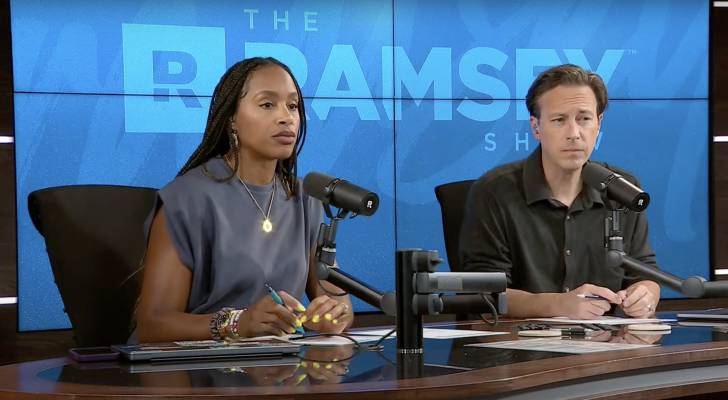
When you enter into a marriage, you expect your spouse to be faithful. But sometimes, a different type of infidelity — financial — can rear its ugly head.
That’s what happened to Cathy from Dallas, Texas, who recently called into The Ramsey Show seeking urgent financial advice.
Cathy revealed to co-hosts Ken Coleman and Jade Warshaw that she suspects her to-be ex-husband has racked up close to $1 million in debt behind her back — and she’s worried that she’s on the hook for half of it.
Cathy filed for divorce in late April, after learning about her husband’s ongoing financial infidelity — however, after a 27-year marriage, she’s trying to escape as unscathed as possible.
Here is what Coleman and Warshaw had to say.
Don’t miss
- I’m 49 years old and have nothing saved for retirement — what should I do? Don’t panic. Here are 5 of the easiest ways you can catch up (and fast)
- Gain potential quarterly income through this $1B private real estate fund — even if you’re not a millionaire. Here’s how to get started with as little as $10
- You’re probably already overpaying for this 1 ‘must-have’ expense — and thanks to Trump’s tariffs, your monthly bill could soar even higher. Here’s how 2 minutes can protect your wallet right now
What happens when financial infidelity rears its ugly head?
Money can be a huge driver of marital strife — especially when one spouse keeps secrets.
A late 2021 survey by the National Endowment for Financial Education found that 43% of people with combined finances in a relationship have committed an act of financial infidelity.
For 39%, that meant hiding a purchase or bank statement from their partner. For 19%, it meant hiding cash. And for 16% of people, financial infidelity ultimately led to divorce.
Cathy, meanwhile, blames her situation on the fact that she allowed her husband to handle the family finances for many years while she became a stay-at-home mom to their four children. But when she did some digging, she learned that her now-ex had been keeping many financial secrets.
For one thing, he hadn’t paid income taxes in three years, which amounts to about a $160,000 debt. Since their taxes are filed jointly, Cathy assumes she’ll be liable for half that sum.
The husband also owes $80,000 in credit card debt on cards Cathy didn’t know exist (and there may be more). Plus, there’s a $550,000 mortgage on Cathy’s husband’s office building that she signed.
On top of everything else, in 2019, Cathy’s husband borrowed $500,000 from Cathy after she received an inheritance, which she is counting towards the debt. He claimed he was spending the money on his business.
But Cathy doesn’t have a record of how that money was spent, and Coleman and Warshaw told her to assume that’s money she won’t ever get back. "I feel like an idiot," Cathy said while describing the situation.
Warshaw and Coleman said they believe Cathy is going to be responsible for 50% of certain debts her name is on. However, it’s unclear as to how much she’ll actually owe or whether there is additional outstanding debt, as her ex isn’t forthcoming with the information.
However, thanks to the IRS’s innocent spouse relief program, Cathy may not be liable for her spouse’s tax debt if she didn’t know about the errors — and if the $80,000 in credit card debt isn’t in her name, she may be off the hook there, too.
So all told, Coleman thinks Cathy is looking at owing at least $250,000 in debt — presumably from her half of the mortgage on her spouse’s office building.
Thankfully, Cathy and her spouse own a paid-off home worth about $2 million. So, there are some assets that can be used to pay off the debt.
But Warshaw had to gently admonish Cathy for letting the situation get to this point.
"It can’t just be, ‘he handles that, I handle this,’" Warshaw said. "You also have to own your part in it."
Read more: Want an extra $1,300,000 when you retire? Dave Ramsey says this 7-step plan ‘works every single time’ to kill debt, get rich in America — and that ‘anyone’ can do it
How to dig yourself out of debt after financial infidelity and plan for the future
"This is not the end of the world," said Coleman, when describing Cathy’s situation.
In addition to being able to leverage an existing asset (her paid off house), Cathy just got a job as an appellate attorney and expects to make $130,000 this year. Between her salary and splitting the proceeds of selling the house, Coleman and Warshaw expect that she’ll come out okay.
"It sounds like there is going to be enough assets for you to clear your debt and still have a decent amount of money," Warshaw reassured Cathy.
"You’ll be OK long-term," Coleman said, echoing that sentiment.
If you find yourself in a similar situation, this can be a reasonable first step, once you’ve taken stock of all your debts and assets more accurately.
Coleman and Warshaw also reiterated their hope that Cathy learned a lesson from this experience. In her next relationship, she needs to keep everything above board and talk through all financial decisions, Warshaw insisted: “And anything you have questions about, you’re saying out loud. You have something to bring to the table, he has something to bring to the table. No one gets to just ‘handle it.’”
With any luck, Cathy will never end up in a situation where she sits back and doesn’t keep tabs on her finances.
This would mean getting acquainted with the five pillars of financial literacy, being involved in any financial planning, budgeting, contributing to an emergency fund, and planning for retirement, among other things.
In a 2024 Fidelity survey, more than 25% of partners resent being left out of financial decisions. So be vocal and set the guardrails early on for what you expect of your partner, when it comes to financial decisions.
Being equal partners on all things finance-related could help avoid not just a situation like the one Cathy got into, but marital conflict more broadly.
What to read next
- Millions of Americans now sit on a stunning $35 trillion in home equity — here’s 1 new way to invest in responsible US homeowners while targeting a 14%-17% IRR
- Robert Kiyosaki warns of a ‘Greater Depression’ coming to the US — with millions of Americans going poor. But he says these 2 ‘easy-money’ assets will bring in ‘great wealth’. How to get in now
- Here are 5 ‘must have’ items that Americans (almost) always overpay for — and very quickly regret. How many are hurting you?
This article provides information only and should not be construed as advice. It is provided without warranty of any kind.


